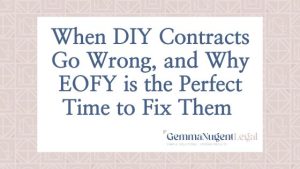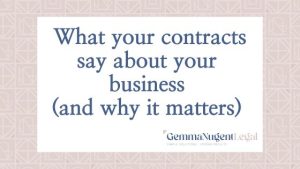If you’re a consultant or a subcontractor on a large project team, you may have noticed (or possibly, ignored ??) lots of documents at the end of your contract. These might include all sorts of things: a list of the Principal’s policies, a collateral warranty, a sample stat dec, some deeds of novation, the kitchen sink… You get the idea. Sometimes clients ask me about these extras. And one of the questions is: Gemma, what is a Deed of Final Release?
So, what is a Deed of Final Release?
A Deed of Final Release is a legal document, usually executed by the supplier in favour of the buyer.
In it, the supplier promises that the project is truly finished. The supplier will never make another claim (i.e., ask for more money) under the contract. If they don’t speak now, they must forever hold their peace.
When is it signed?
The supplier will usually have to sign the deed as a condition of receiving the final payment under the contract, either at practical completion or the end of the defects liability period (or both). It might also be a condition of the buyer releasing any performance security held until the end of the defects liability period.
This will be an obligation in the body of the contract itself, often in the “final payment claim” or “release of security” clause.
What is its purpose?
Its practical purpose is to put the buyer in a position where they can close the project file and (if they’re the head contractor) close out the relationship with the Principal. They don’t have to worry that some unexpected invoice will land in the accounts payable inbox a year down the track.
I’m a supplier. Should I be worried about the Deed of Release?
In my view, it’s reasonable for the buyer to want to confidently close the project, safe from unexpected future payment claims.
As the supplier, you should be able to confirm that you have issued your last invoice.
However, many buyers use it as an opportunity to sever any relationship between them and their supplier. That means they’re released from any claim whatsoever; not just payment claims.
A third party may suffer a loss and claim that loss from a supplier, even if it is partly the buyer’s fault. The release may prevent the supplier (or their insurer) from mounting a defence or a claim for contribution. The release may stop the supplier from claiming a contribution from the buyer. You can resolve this by carving out contribution in relation to third party claims .
Occasionally the buyer also throws in a sneaky indemnity that is wider than the contractual indemnity, and not limited by the contractual limitation of liability. To me, this is a definite no-no and suppliers should reject it.
Another common risk is where the terms of the contract require the supplier to appoint the buyer as its “attorney” to execute the release. Suppliers should say no to this. A contractual obligation to sign the release is sufficient, and in any event the buyer is often entitled to hold onto the final payment until that obligation is observed.

Can I be “deemed” to have agreed to the release?
It’s very common to see this kind of clause in construction contracts. It says something like “you must execute the deed within X days after our request. If you don’t, you will be deemed to have released us on the same terms as Annexure Z”. I suspect these clauses would not be enforceable, but they’re difficult to resist.
Suppliers can address this pragmatically:
- Introduce a third party claim carve out to the deed;
- Keep payment claims up to date;
- When the buyer asks you to execute a deed, check it matches the annexure; and
- Check and execute it promptly.
Next Steps
I’m passionate about plain English contracts. However, indemnities and releases tend to be heavy on legal jargon and hard to follow. If you can’t make head or tail of the Deed of Release (or any other part of your contract), don’t go it alone. I’m here to translate it for you.






